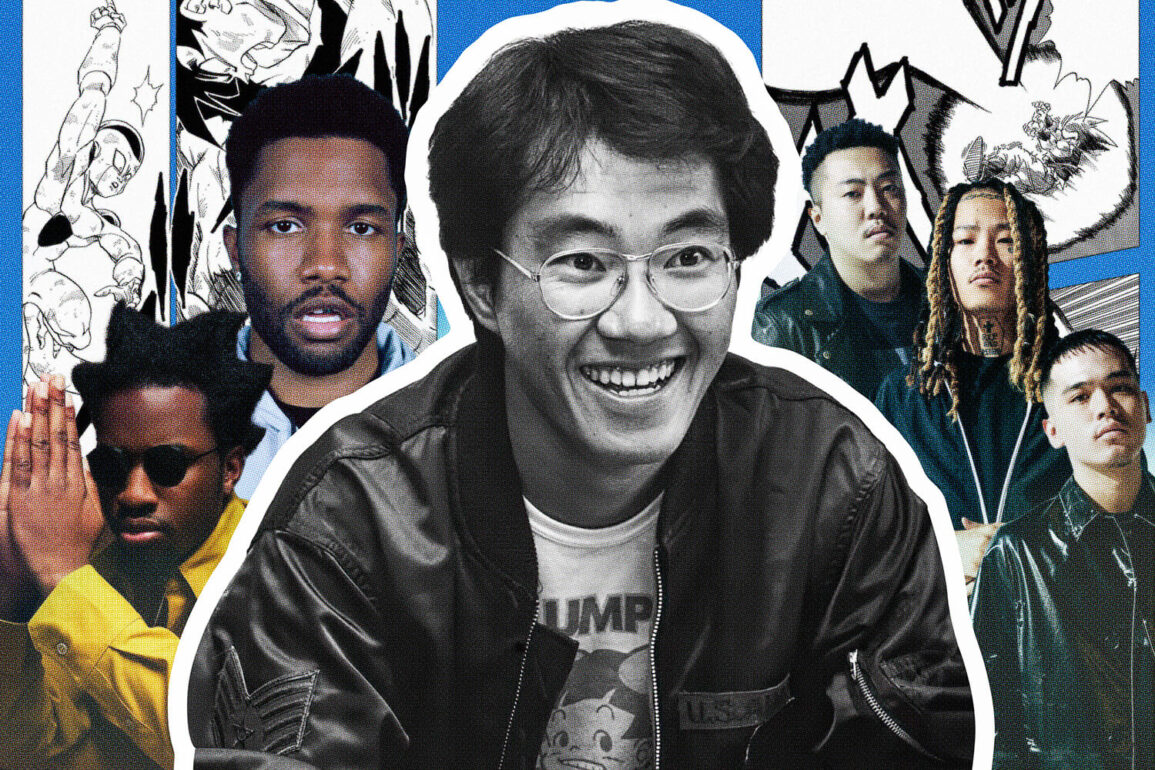The recent passing of Akira Toriyama, the renowned creator of the iconic Dragon Ball franchise, has left an indelible mark on the world of manga, anime, and beyond.
One of Japan’s most important authors in the history of the medium, Toriyama’s influence extended far beyond fiction, resonating deeply within fashion, sports, and music, notably within the rap genre, where his characters and themes inspired a multitude of artists and fans alike.
Among Toriyama’s work, including Dr. Slump, Sand Land, and his contributions to the Dragon Quest series, his magnum opus, Dragon Ball, serialised first in 1984 via Weekly Shōnen Jump, transcended cultural boundaries to become a global phenomenon.
Released in over 40 countries, the manga sparked multiple long-running anime series and over 20 films, capturing the imaginations of millions worldwide. Its impact on young artists within hip-hop culture is profound, drawing inspiration from Goku’s journey, the series’ vibrant characters, and its overarching themes of resilience, determination, and self-improvement.
” data-image-caption data-medium-file=”https://i0.wp.com/electricbloomwebzine.com/wp-content/uploads/2024/03/Dragon-Ball-First-and-Last-Volumes-1.jpg?fit=300%2C200&ssl=1″ data-large-file=”https://i0.wp.com/electricbloomwebzine.com/wp-content/uploads/2024/03/Dragon-Ball-First-and-Last-Volumes-1.jpg?fit=1024%2C683&ssl=1″ src=”https://i0.wp.com/electricbloomwebzine.com/wp-content/uploads/2024/03/Dragon-Ball-First-and-Last-Volumes-1.jpg?resize=1024%2C683&ssl=1″ alt=”The Legacy of Akira Toriyama | Dragon Ball Manga” class=”wp-image-5705″ srcset=”https://i0.wp.com/electricbloomwebzine.com/wp-content/uploads/2024/03/Dragon-Ball-First-and-Last-Volumes-1.jpg?resize=1024%2C683&ssl=1 1024w, https://i0.wp.com/electricbloomwebzine.com/wp-content/uploads/2024/03/Dragon-Ball-First-and-Last-Volumes-1.jpg?resize=300%2C200&ssl=1 300w, https://i0.wp.com/electricbloomwebzine.com/wp-content/uploads/2024/03/Dragon-Ball-First-and-Last-Volumes-1.jpg?resize=768%2C512&ssl=1 768w, https://i0.wp.com/electricbloomwebzine.com/wp-content/uploads/2024/03/Dragon-Ball-First-and-Last-Volumes-1.jpg?resize=360%2C240&ssl=1 360w, https://i0.wp.com/electricbloomwebzine.com/wp-content/uploads/2024/03/Dragon-Ball-First-and-Last-Volumes-1.jpg?w=1500&ssl=1 1500w” sizes=”(max-width: 1024px) 100vw, 1024px” data-recalc-dims=”1″>
Left: The inaugural volume of the Dragon Ball manga, published in 1985. | Right: The final volume, published in 1995.
For me, the franchise became intertwined with rap during my formative years. Pulling possibly virus-filled Dragon Ball Z video files from LimeWire and cutting them together with tracks like DMX’s ‘Party Up’ and ‘Fight Music’ by D12 to make animated music videos was a common pastime.
As time went on, the connection between Dragon Ball and hip-hop became more tangible as a myriad of artists who grew up immersed in Toriyama’s worlds began dropping references in rap lyrics, music videos, and their own personas. From Jay Rock to Frank Ocean, Tyla Yaweh to J. Cole, Dragon Ball’s influence runs deep in the veins of hip-hop, permeating through generations of artists.
Goku, the series’ protagonist, emerged as an aspirational icon, revered almost like a saint among fans. His relentless pursuit of power and success, coupled with his unwavering loyalty to loved ones and his ability to find redemption even in the evilest beings across the universe, struck a chord with many. For those in the rap game, Goku’s journey mirrored the pursuits of those within the competitive industry, each striving to scale new heights in their careers. Toriyama’s creation served as a metaphor for the artist’s journey, encapsulating the spirit of dedication and hard work.
In Japan, hip-hop artists like BAD HOP embraced Dragon Ball’s legacy, crafting anthems like ‘I Feel Like Goku’, celebrating the carefree spirit and boundless energy epitomized by the series’ characters.
The likes of The Weeknd, Chance The Rapper, Denzel Curry, and Metro Boomin, have all paid tribute to Toriyama. Denzel Curry, reflecting on his upbringing and artistic journey, expressed gratitude for Toriyama’s inspiration, noting how Dragon Ball shaped his approach to artistry, martial arts, and even his personal style.
“Akira Toriyama’s work has inspired me to be the best artist I can be. Growing up in Carol City with a house full of brothers, his work was always something that my siblings and I bonded over. His work on Dragon Ball, Dragon Ball Z, GT, and Super made me want to be the best version of myself because Goku was the person that kids looked up to. Toriyama’s work made me do a lot of things and taught me a lot of things.”
Denzel Curry
Akira Toriyama’s impact on hip-hop, and art as a whole, will continue to resonate for generations to come, a testament to the timeless power of his imagination.
As the world bids farewell to a legend, we honour his memory through the music, the art, and the spirit of Dragon Ball. Akira Toriyama may be gone, but everything he has built over 40 years lives on, uniting disparate worlds in a shared celebration of creativity, resilience, and the pursuit of greatness.
Related
This post was originally published on this site be sure to check out more of their content.







